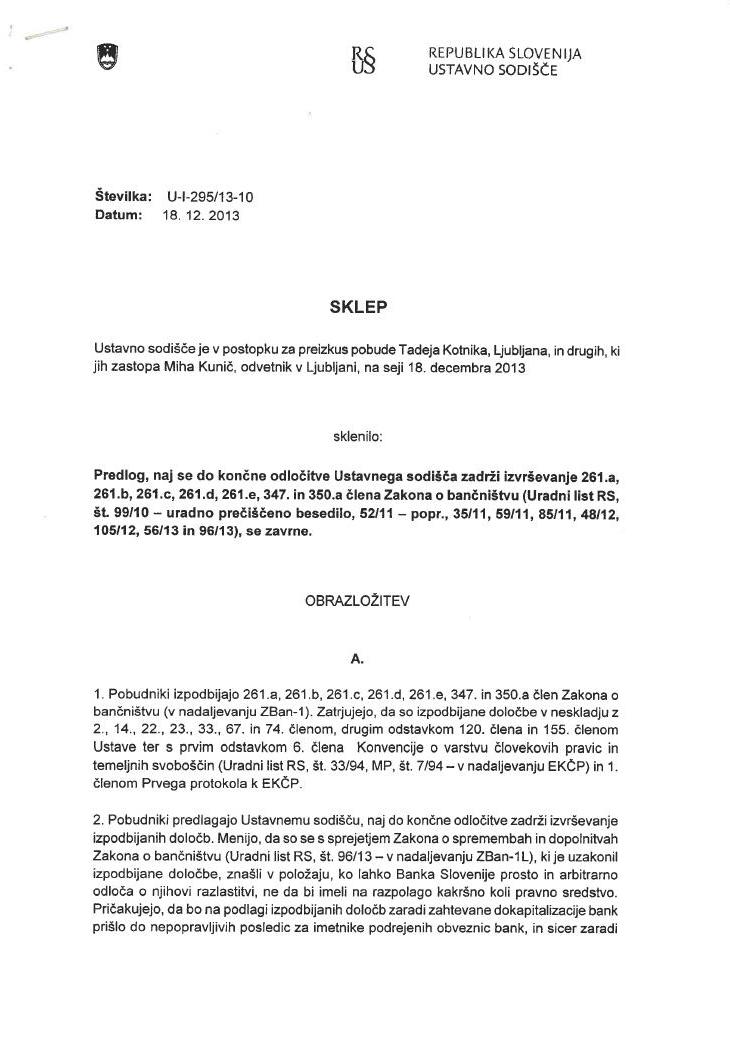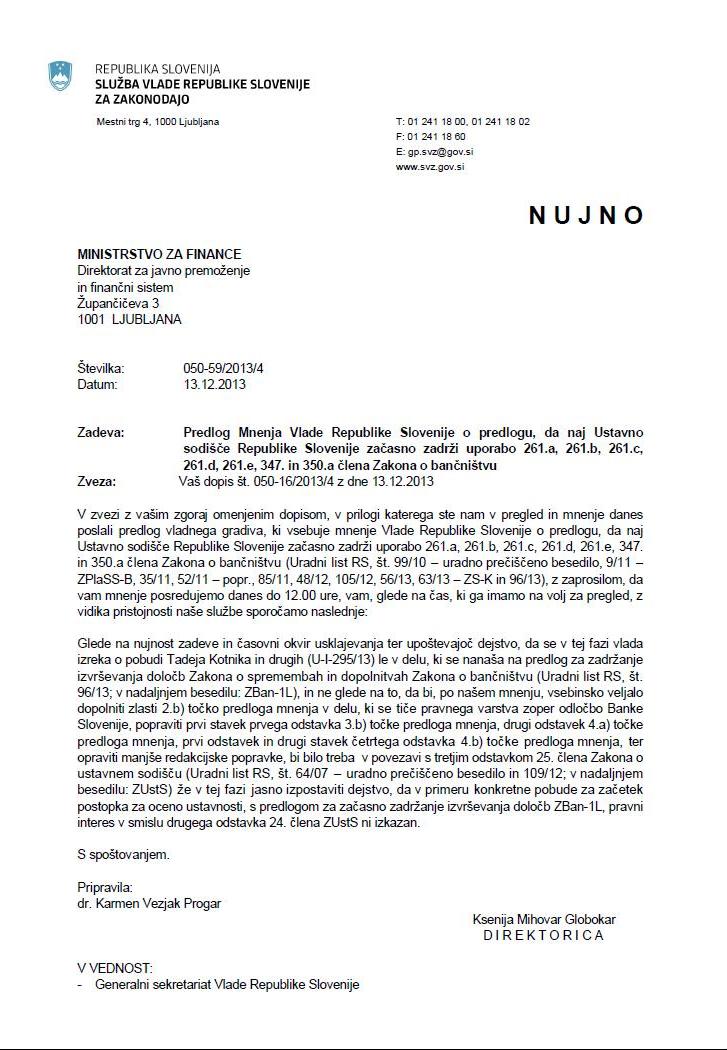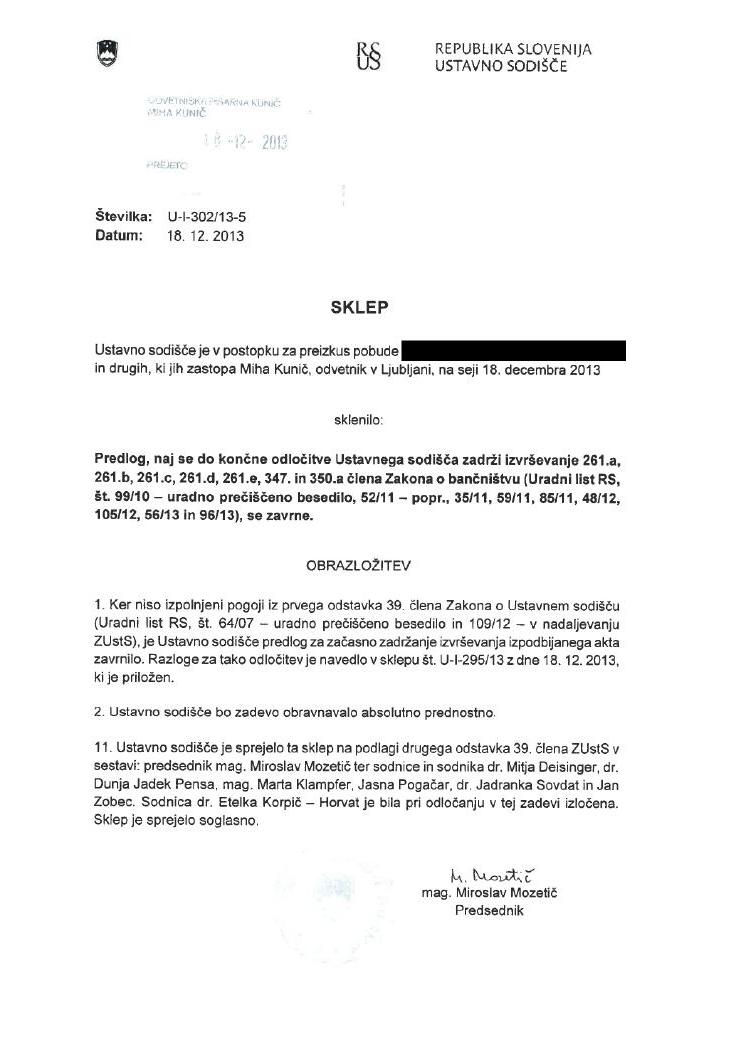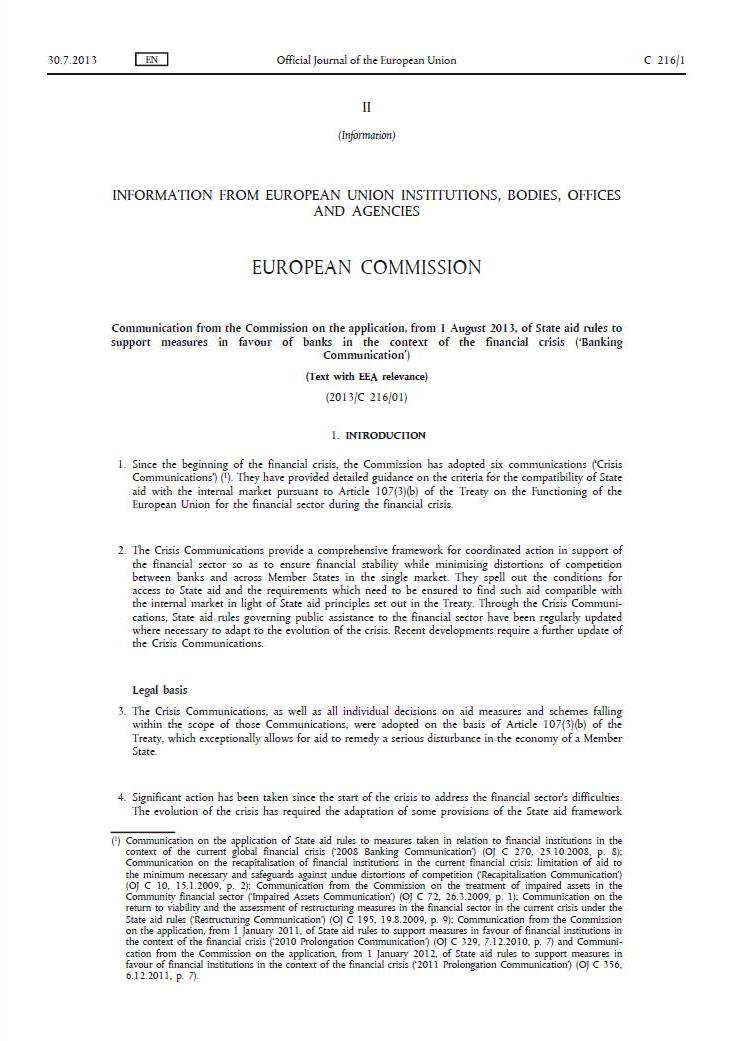Constitutional Court of the Republic of Slovenia at the meeting held on Wednesday, December 18th, adopted a decision to accept into hearing the initiatives for constitutional review of the Banking Act (ZBan-1L), which were proposed on 4th and 10th December by the Pan-Slovenian Shareholders' Association (VZMD) which submitted the initiatives through Kunič Law Office in the name of 290 holders of bonds. The Constitutional Court accepts for hearing only those initiatives whose initiators have expressed legal interest, and the judges of the Constitutional Court have rejected statement made by the Slovenian Government which has been claiming that the initiators do not show legal interest and therefore the Court should dismiss their initiative.
The Constitutional Court has also accepted the suggestion of the initiators that their initiative should be treated preferentially. It has even decided that the initiative will be treated with absolute precedence, which means that the procedure of the constitutional review of the amending act continued on Wednesday.
Unfortunately, the Constitutional Court has rejected the proposal of initiators to withold the implementation of this statute until the Court's final decision is made. It seems that the misleading claims of the Slovenian Government, the Ministry of Finance and the Bank of Slovenia about the »catastrophic consequences« and »jeopardy of the entire financial system in the Republic of Slovenia« which would be the result of such witholding, along with the fact that the holders will only have »material« consequences, convinced the Constitutional Court Judges that the proposed witholding is not necessary.

None of the three banks or boards thought it would be appropriate to express their regret, let alone apologize to their investors and creditors – A-bank board has in the previously mentioned statement even ludicrously written that A-bank »as a bank important for the system, with stable operating profit, will continue to pay special attention to ensure security and stability of operations".
Before the Wednesday's session of the Slovenian Institutional Court VZMD submitted to the Institutional Court of the Republic of Slovenia through Kunič Law Office in the name of 290 holders of bonds the initiatives for constitutional review, or a written reply to the statement by the Slovenian Government about both VZMD initiatives for constitutional review of the Banking Act (ZBan-1L). VZMD has, with these two initiatives, also suggested witholding implementation of disputable amending act. Some VZMD experts think that this opinion - which the Slovenian Government adopted and published on Friday, 13th December 2013, after being asked by the Constitutional Court to make its stand on the initiatives for constitutional review - is absolutely misleading.

However, the Slovenian Government in its Press Release keeps pretending ignorance, because it simply states that »challenged articles do not interfere with the rights of investors«(?!), that it will be possible to eliminate the »consequences of the challenged articles by constitutional appeal« (after previous constant assurances that it will not be necessary to abolish the consequences, because none of them is against the law), that in case of witholding ZBan-1L »procedures of bank assistance will be in contrast with the EU legislation about bailouts« and it has once again concealed that the guidelines of the European Commission from 1st August 2013 are not binding, and the directive is to be made in the following year, and the member states are to enforce it on 1st January 2018, and on top of that in Article 35, which defines bank measures for gathering capital, they talk about the »voluntary transformation of the subordinated instruments into capital on the basis of stimulation«! The Government of the Republic of Slovenia furthermore in the publicly published material – contrary to the principles regarding protection of personal data – reveals the name of the initiator of the constitutional review, a member of the VZMD Expert Council, Tadej Kotnik, PhD, and it gives to the Constitutional Court a statement that the »initiators do not show any legal interest to challenge ZBan-1L«. Although the assessment of legal interest is not the government's domain, VZMD is wondering if the government of the Republic of Slovenia is not familiar with the fact that the initiative was also filed in the name of NLB bond holders of 26th issue – NLB announced last Thursday that the holders of all NLB d.d. subordinated bonds will have their bonds cancelled, in full and without any compensation?! Apart from that VZMD also emphasizes the A-bank announcement stating that all holders of subordinated bonds will lose their entire investment, also by cancellation, which is – according to the claims by the Ministry of Finance of the Republic of Slovenia – necessary for establishing enough capital for A-bank operations, and the following day A-bank announced that it will invest 5 million EUR of capital into Argolina d.o.o. company which is involved in »investment engineering«!!!
The Government of the Republic of Slovenia in its Statement - sent to the Constitutional Court of the Republic of Slovenia regarding the VZMD proposal for temporary witholding ZBan-1L, given in the framework of U-I-295-13 initiative – is trying to argue the point that witholding ZBan-1L is dangerous on the basis of 8 claims which are, as paragraphs, stated twice: first in point 5 of the summary of material, and then again on the 1st page of the Statement itself, and later it tries to justify these claims one by one.
Therefore we have decided to publish a reply or arguments of some VZMD experts related to the Statement of the Slovenian Government, according to the individual claims:
1.) The Government claims that »the challenged articles do not interfere with the rights of investors«. Provisions regarding writing-off qualified obligations of a bank which have been entered in ZBan-1 with the amending act ZBan-1L provide that, in case any of the Slovenian banks gets State aid, debts of all those creditors of the bank who were, in case of its bankruptcy in the sequence of paying bank liabilities placed after the holders of bank deposits and ordinary bonds, are simply cancelled. NLB bank has already officially announced that such a measure will befall all holders of subordinated bonds of this bank by using ZBan-1L. The measure of cancelling subordinated bonds before implementing ZBan-1L was not possible even when bank went bankrupt, because bankruptcy does not terminate any of the debtor's liabilities, only the way of their payment changes. In regular operations debts are paid until their due date, in bankruptcy in the order of their subordination – first prior claims (salaries due), then regular (in banks these are deposits and ordinary bonds), then subordinated (subordinated bonds, then hybrid bonds, at the end shares). If there is a lack of bankruptcy mass, then some creditors are left without payment, however not without their debts – if at any time after the end of the bankruptcy procedure some non-registered property of a debtor is found, this is also used for payment of debts which have not been paid yet. Therefore, according to our opinion, it is clear that the intervention into the rights is present and very obvious.
2. and 3.) The government claims that »the consequences of the challenged articles can be abolished by constitutional complaint« and that »the consequences will only be of material nature«. This is in contradiction with the Government's claims made so far, namely that it will not be necessary to abolish ZBan-1L consequences, because none of them is against the law. Now the Government allows that there will be some consequences which will be against the law, but it says that they will be »only material« - therefore they can be abolished by compensation. It is difficult to judge all the consequences that can have unlawful confiscation of an important part of someone's property. In case of legal entities this can lead to insolvency and consequently to bankruptcy and termination of business operations, including the termination of employment of all employees, which can be difficult to solve with compensation.
4.) The Government claims that "ZBan-1L requires that the creditors, whose claims were the subject to a measure, do not have losses that are bigger than the losses they would have in case of bank's bankruptcy«. NLB, d.d., announcement from 12 December, cited under item 1, explicitly states that the use of ZBan-1 »probably means writing-off of all currently valid subordinated instruments at NLB d.d.« STA has also already reported that subordinated NLB d.d. creditors will lose an entire investment with this measure. Thus the Government's claim could only hold true if, in case of NLB bankruptcy and the use of all valid legal provisions, none of the subordinated creditors of this bank received any payment.
However, that this, in case of subordinated bonds of NLB d.d. as an issuing bank, is not true, can be proved by a simple calculation: if NLB d.d. went bankrupt, then all loans given to this bank by the state (Republic of Slovenia) as its main owner, would turn into bank's assets, according to the 498 Article of the Companies Act (ZGD-1). According to the latest accounting statements from 30 September 2013 the state had in NLB, d.d. a deposit in the amount of 1.36 billion euros, which means that even if, in case of insolvency NLB capital was negative in the amount of 1.36 billion euros, the capital would with this conversion again reach point zero, which in terms of bookkeeping suffices that all creditors of the company are entirely paid, including those most subordinated ones. In principle it is possible that there were additional losses that would arise as a result of cashing bankrupt's estate, but on the day NLB, d.d. officially announced that its subordinated creditors will be entirely expropriated of their claims, its capital definitely was not so deeply negative, even it had been calculated according to the most unfavourable scenario of stress tests. The amount of NLB, d.d. capital calculated in stress tests was not publicly announced, but a statement that, even if considering the most negative scenario with capital increase in the amount of 1.9 billion euros, a 15% capital adequacy of this bank will be achieved, which means that with such capital increase, even with such scenario, NLB, d.d. capital would be approximately 1.7 billion euros (15 per cent of bank resources in the total amount of 11 or 12 billion euros), which means that without this capital increase, this capital would be negative in the amount of approximately 200 million euros. If this negative capital was the reason for NLB, d.d. bankruptcy procedures, the transformation of state deposit, as defined in Article 498 of ZGD-1, would place capital back on the positive level, in the amount of more than a billion euros, which definitely would be enough to pay off all creditors, even those most subordinated ones.
5.) The Government claims that »all procedures regarding aid to banks will run into difficulties, if they are carried out contrary to the rules of the European Union regarding State aid«. The Government has in this claim again »overlooked« the fact that the guidelines of the European Commission are not binding; only a directive which is a technical legal document with unambiguous and precisely defined terminology, and which is formed on the basis of non-technical guidelines, represents binding instructions that provisions of this directive need to be enforced in national legislation of the EU member states. In case of guidelines regarding State aid to banks, the directive is to be formed in the following year, and member states are to put it into force on 1st January 2018, and until then this directive is not to be binding.
In addition to this the guidelines in the report of the European Commission regarding the use of rules about State aid to banks that the Government refers to, in Article 35, which defines bank measures for collecting capital, talk about »voluntary transformation of subordinated instruments into capital on the basis of an incentive«, and ZBan-1L defines that this transformation, without the owners' will or negotiations with them, be ordered by the Bank of Slovenia, and it can also substitute it by a compulsory write-off – also in its entirety, which was in NLB, d.d. public statement cited in item 1, already officially announced.
6.) The Government claims that »banks have to be aware of the fact that breaking the rules of the European Union means that the European Union will demand that countries return financial means which were unlawfully received, which means that rehabilitation of bank system will not be successful«. This claim repeats the thesis that the guidelines are law, which is not true; even a directive is not a law, but only an injunction which indicates that provisions of a directive need to be enforced by a law, and by enforcing a law in the national legislation the use of these provisions becomes binding, and it is against the law if we do not use them.
7.) The Government claims that »the financial resources which the country has at disposal at the moment may be insufficient, and it will not be possible to ensure capital adequacy of banks«. State Secretary at the Ministry of Finance officially declared on 29 November that:«4.7 billion euros will be the maximum amount invested into banks«. When the results of stress tests were announced they said that the State will contribute 3.01 billion euros for bank recovery of NLB, NKBM and A-bank, for capital increase of Probanka and Factor Bank 441 million euros, and for capital increase of bad bank (DUTB) additional 200 million euros, therefore 3.65 billion euros altogether. An entire subordinated debt of the Slovene banking system totals 800 million euros – subordinated debt of the previously mentioned banks is lower – therefore it is clear that because this debt will not be written off, the required financial means from the current 3.65 billion euros cannot exceed 4.7 billion euros.
8.) The Government claims that »emergency measures needed for the recovery of bank system will not be implemented«. This also is not true, because the government can carry out all other measures which can be implemented by using all provisions of the Measures for Strengthening Bank Stability Act (ZUKSB) and all ZBan-1 provisions which have been in use before ZBan-1L was introduced.
Other Related International Activities:
EXCLUSIVE VIDEO REPORT about the week of the MOSCOW-VIENNA-CAPETOWN conferences involving the following: active participation of the international business-investment VZMD programmes, signing a memorandum with the Russian Federation of Investors, and protection of rights of the Slovene and European shareholders at the Viennese conference »The Financial Repression of Savers and Investors« (Moscow, Vienna, Cape Town, October 2013)
WORLD BANK – President of VZMD and EuroFinUse Board Member speaker of the first panel at the international conference about audit reform and the importance of audit committees (Bucharest, June 2013)
INDIA – visit of Slovenian government and business delegation – on the basis of Memorandum between ICPE and VZMD international investors' programs investo.si and investo.international also present (New Delhi, February 2013)
EXCLUSIVE VIDEO REPORT of “International Conference on Benefits and Challenges of Public Private Partnerships for improving Energy Efficiency” – key statements of prominent participants (Ljubljana, October, 2012)
VIDEO REPORT - International Conference at the Brussels Stock Exchange Stimulated Investors' Representatives and Institutions to Participate at the Investors' Week 2012 in September in Slovenia(Brussels, March 2012)
www.vzmd.si – More on the VZMD – PanSlovenian Shareholders' Association
www.vzmd.tv and www.investo.tv – Over 300 videos from VZMD.TV and investo.tv
www.investo.si – More on the investo.si – Invest to Slovenia Program
www.invest-to.net – More on the network of 55 national organizations of shareholders and investors – invest-to.net














